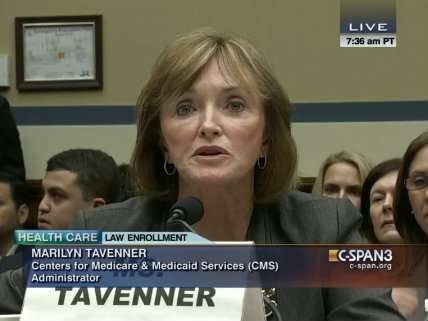Why the Supreme Court Should Ignore Insurance Subsidy Disruption in the Obamacare Subsidies Case

The Washington Post's Greg Sargent looks at how many people could be affected by a Supreme Court ruling in King v. Burwell, an upcoming challenge to the implementation of Obamacare. The challengers in the case argue that the plain text of the law does not allow for the provision of health insurance subsidies in the law's federally run health insurance exchanges; the administration argues that the overall purpose of the law allows for its decision to disburse subsidies in federal exchanges. If the Court sides with the challengers, then federal exchange enrollees who receive subsidies would lose them, increasing the cost of their insurance.
Sargent points to recent enrollment data suggesting that the number of affected individuals could be higher than a previous estimate of about four million.
"The reason this matters," Sargent writes, is that "highlighting the potential for such a SCOTUS decision to result in widespread disruptions and dire consequences — both for millions who might lose coverage and for the insurance and health care industry in these states — may figure heavily in the government's strategy for winning the case."
Basically, the government may attempt to convince the court that its interpretation of the law should be allowed because the disruption involved in ruling for the challengers might be too large.
This is not much of a legal theory or argument. If the administration's approach to implementing Obamacare is not allowed by the law, then the court should rule against it, period. That's true even if the disruption caused by ruling against the administration turns out to be quite large; indeed, the scale of the disruption would suggest the scale of the illegality.
Furthermore, ruling along these lines would set a terrible precedent. Allowing the administration to continue with an illegal implementation because stopping it would be disruptive would create incentives for this administration and others in the future to pursue illegal actions and then insulate themselves by finding ways to make ending those actions disruptive.
In a way, this appears to be what the administration has already done by declining to inform enrollees about the legal uncertainty surrounding the subsidies.
If the administration was truly worried about the possibility of disruption to subsidized enrollees on the federal exchanges, you might think they would have warned those enrollees about the possible consequences of a Supreme Court decision in favor of the King challengers.
But the administration has done no such thing. In fact, the administration has refused to agree that such warning is necessary. At a congressional hearing last month, Marilyn Tavenner, the head of the Centers for Medicare and Medicaid Services, which oversees Obamacare implementation, was asked repeatedly whether federal exchange enrollees received any notice about the possible consequences of a Supreme Court ruling against the administration, which could include higher premiums and tax liability.
In response, she insisted that "nothing has changed for consumers—they can still come in" and enroll on the exchanges. "This is not is not a closed case and I'm not going to speculate," she said. "The law is pretty clear." The exchange with Rep. Jim Jordan (R-Oh.) starts around the 1:31 mark.
Now, Tavenner is in some sense right; the law is pretty clear. But it's clear that the administration's implementation is illegal. The text of the Affordable Care Act states on multiple occasions that subsidies are only allowed in "an Exchange established by the State," with "State" defined to mean the fifty states and the District of Columbia. These exchanges are only allowed under a section of the law—1311—that deals exclusively with state-run exchanges.
If administration legal officials pursue the strategy outlined by Sargent, it will be an attempt to have it both ways. On the one hand, they will have implied to potential enrollees that they should proceed with signing up for subsidized coverage because there is no risk of disruption. And on the other hand they would be arguing to the Supreme Court that it should rule in the administration's favor because the otherwise the potential disruption would be too great.
